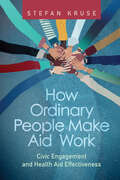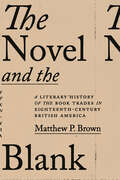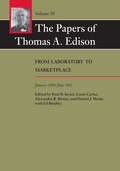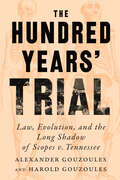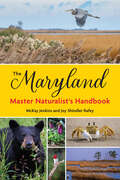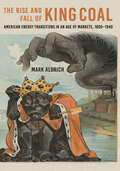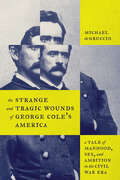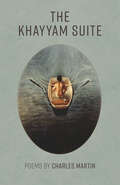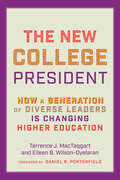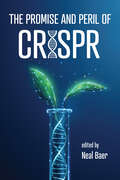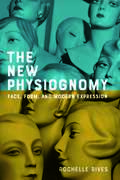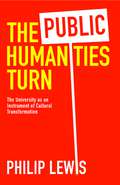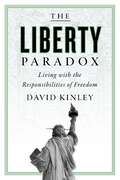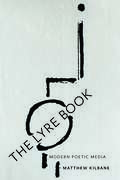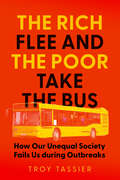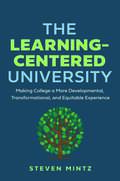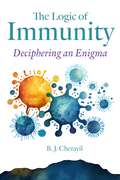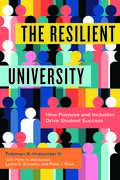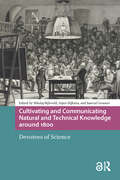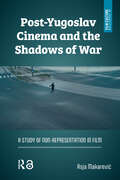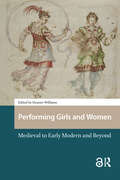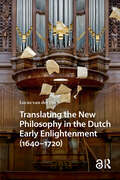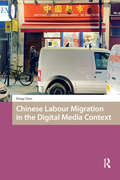- Table View
- List View
The New College President: How A Generation Of Diverse Leaders Is Changing Higher Education
by Terrence J. MacTaggart Eileen B. Wilson-OyelaranThe Power of Placebos: How The Science Of Placebos And Nocebos Can Improve Health Care
by Jeremy HowickThe New Physiognomy: Face, Form, And Modern Expression (Hopkins Studies In Modernism Ser.)
by Rochelle RivesThe Public Humanities Turn: The University As An Instrument Of Cultural Transformation
by Philip LewisThe Rich Flee and the Poor Take the Bus: How Our Unequal Society Fails Us During Outbreaks
by Troy TassierThe Learning-Centered University: Making College A More Developmental, Transformational, And Equitable Experience
by Steven MintzThe Resilient University: How Purpose And Inclusion Drive Student Success
by Freeman A. Hrabowski III with Peter H. Henderson, Lynne C. Schaefer, and Philip J. RousCultivating and Communicating Natural and Technical Knowledge around 1800: Devotees of Science (Studies in the History of Knowledge)
by Nikolaj Bijleveld Arjen Dijkstra Samuel GessnerThis is a book about some of the unexpected people and places involved in cultivating knowledge of the natural world and mastery of scientific apparatus around 1800, taking readers across continental Europe from the Enlightenment to the onset of academic professionalisation. The authors widen the horizon of inquiry by looking beyond the scientific elite of academies and prestigious science sponsored by princely courts, the focus of previous major studies of this time period. They consider people of diverse professions and occupations who advanced scientific knowledge through practical means by devoting their spare time and personal resources, thereby crossing geographic, linguistic and societal barriers. The case studies together demonstrate that such individuals contributed substantially to the spread of new knowledge and found ways to contribute technical innovations to society. The present volume is devoted to these people: the devotees of science.
Post-Yugoslav Cinema and the Shadows of War: A Study of Non-Representation in Film (Film Culture in Transition)
by Asja MakarevicBosnia-Herzegovina is still considered a post-war country. The concept of post-war implies that the country and its people are tied more strongly to the past than they are oriented towards the future. Paradoxically, as long as the future is kept at bay and the post-war condition kept alive, Bosnia maintains a certain significance on the global scene. However, living in the temporal vacuum of the post-war condition cannot be a long-term perspective. A range of post-Yugoslav films provides spectators with images that offer innovative approaches to the collective past, while simultaneously reframing contemporary experience. This study proposes to call non-representational images appears to offer a more dynamic relationship to the past and the present, while reflecting complex processes of the formation of identity, memory, guilt, and responsibility. But if these dynamics are inherent in non-representational images, is there a way in which they can contribute to overcoming the post-war condition?
Performing Girls and Women: Medieval to Early Modern and Beyond (Gendering the Late Medieval and Early Modern World)
by Deanne WilliamsThis book charts the broad cultural impact of the medieval and early modern female performer: how she engages with her historical origins in classical drama, works within contemporary cultural and professional networks, and sets the terms for female performance in subsequent historical periods. Moving beyond the archival evidence that establishes that medieval and early modern women and girls performed, it explores how their performances resonated across national boundaries and historical periods, revealing wide patterns of influence and inspiration. This collection of original essays brings together well-established authorities with new and emerging scholars, offering innovative and ground-breaking discussions of medieval dramatic cultures, the Shakespearean stage, professional actresses in Spain and Italy, the performance of music and dance, artistic representations of the female performer, and twentieth- and twenty-first-century adaptations. Ranging from tenth-century Germany to twenty-first-century London, the chapters in this volume offer a new set of paradigms for understanding and interpreting women and girls on stage.
Translating the New Philosophy in the Dutch Early Enlightenment (Studies in Early Modernity in The Netherlands)
by Lucas DeijlA small group of freethinkers from the Dutch Republic played a key role in the major intellectual changes of the Early Enlightenment (1640–1720). In the wake of Cartesianism, their rationalist ideas transformed debates about science, theology, medicine, and political theory. This book studies the position of four translators in these debates on the ‘New Philosophy’: Jan Hendriksz Glazemaker, Pieter Balling, Abraham van Berkel, and Stephan Blankaart. It presents a comparative history of their Dutch translations of philosophical treatises by René Descartes, Thomas Hobbes, and Benedictus de Spinoza. A combined methodology of computational and qualitative analysis offers new insights into the form and function of translated philosophical texts within the intellectual debates about language, reason, and knowledge that were partly inspired by those texts. These insights change our understanding of the crucial function of translations, multilingualism, and linguistic purism in the Dutch Early Enlightenment.
Chinese Labour Migration in the Digital Media Context (Media, Culture and Communication in Migrant Societies)
by Hong ChenWhat does it mean to a family when parents go abroad for economic gains while leaving their children behind? How do they maintain a family when living in different areas, separated for years? How do emerging digital media like instant messaging, social media, and webcam calls impact the everyday lives of today’s transnational families? Drawing on immersive ethnography conducted among UK-based Chinese labour migrants, their left-behind children and caregivers, this book explores how they employ digital media to negotiate family roles and maintain kinship ties. While virtual connections are indispensable, they are not a panacea for physical separation; rather, they introduce complexity to family dynamics. Probing the bittersweet experiences of various family members, it portrays how mediated familial communications intertwine with transnational socio-economic asymmetries and intra-familial dynamics. This book offers an interdisciplinary perspective for general publics and academics interested in migration studies, family and gender studies, and media and communications.
